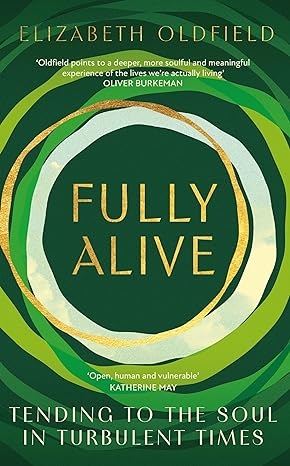Fully Alive: Tending to the Soul in Turbulent Times, by Elizabeth Oldfield
'A luminous recontextualisation of the seven deadly sins', written for those in the contemporary world who are looking for meaning and haven’t yet found it
 Fully Alive: Tending to the Soul in Turbulent Times
Fully Alive: Tending to the Soul in Turbulent Times
By Elizabeth Oldfield
Hodder & Stoughton
ISBN: 978 1 399 81076 0
Reviewed by Shaun Lambert
Elizabeth Oldfield’s new book Fully Alive: Tending to the Soul in Turbulent Times is a luminous recontextualization of the seven deadly sins (wrath, avarice, acedia (restlessness), envy, gluttony, lust, pride), which as the author shows are alive and well in our culture. With creative and poetic wisdom, she outlines seven movements we need to make to tend to our souls: Wrath… From Polarisation to Peace-making; Avarice… From Stuffocation to Gratitude and Generosity; and so on, through the traditional seven sins. She playfully creates words like ‘stuffocation’ to catch our attention.
As a ‘contentedly failed atheist’ she is writing for those in the contemporary world who are looking for meaning and haven’t yet found it. The author wants the book to be an antihistamine for those who are allergic to faith.
In the unfolding of this wisdom she has a turn of phrase that helps you remember the key insights and that are so deceptively informal they slip past your defences.
She has the measure of our turbulent culture, seeing it clearly through repeated considerations. In the chapter on wrath, she helpfully distinguishes wrath as moral indignation from righteous anger, and how this leads to polarisation. Her own approach to peace-making, to listen attentively to those ‘not like me’ (NLMs), is beautifully articulated. If you have had to withdraw from toxic conflict and don’t know where to go next, then perhaps this is the book for you. It certainly gave me hope.
There is an appropriately vulnerable personal story woven into the text and I felt my protective defences drop and an excitement rising about the moral imagination at work in the book.
In her chapter on Acedia… From Distraction to Attention, I found myself agreeing with almost every word. Her own experience of needing to pay attention to her own wellbeing resonated with my story, and will, I think, help many others realise there is a time to step away and stop.
Her definition of envy and the move required from anxiety status to belovedness is deeply contemplative. We are envious of those who surpass us in the things we want in our lives. The author is eminently quotable and deeply psychological in her analysis.
Each chapter offers helpful antidotes to cultural shaping, counter currents, patterns, and practices to be cultivated. She doesn’t avoid the messy, or uncomfortable, the real underbelly of humanity that can make us feel disgust. Alongside this she lays the importance of ecstasy and wonder.
When she deals with lust – from Objectification to Sexual Humanism she writes with common sense and bravery. If we can read it with the same peace-building theory that she writes with then a door to dialogue can perhaps be opened in this most contested of areas. She owns her own interpretive limitations in areas where she is not a specialist, and this is refreshing.
There is a nuanced beauty in the chapter on Pride: From Individualism to Community, as she writes from her own experience of setting up and living in an intentional community. Having lived in an intentional community, and still being connected to one, it was illuminating to see how the community members drew on existing wisdom and yet organically co-created something new.
In the final chapter where she addresses the G Bomb – ‘God,’ the underlying approach to her readers can be seen most clearly. Unlike many Christians she doesn’t try to persuade. Instead, she adopts Jesus’ own method in his parables, which is helping people become aware, to reperceive reality. The whole book is an invitation to train our attention in a different way, to reperceive, inhabiting the world as if there was a God already tending to us, and people were worth paying attention to.
The Revd Dr Shaun Lambert is a Baptist Minister, author, psychotherapist and Honorary Mindfulness Chaplain at Scargill Movement, a Christian community and retreat centre
Baptist Times, 14/06/2024